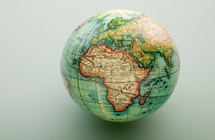科普:每个国家的名字是怎么来的?
|
Ever wondered how England got its name? As with countless other countries, it's all down to a tribe of early settlers (in this case the 5th Century Angles). In fact, almost every country in the world is named after one of four things: 1) a tribe; 2) a feature of the land; 3) a directional description; or 4) an important person. That's according to Quartz, which analysed 195 countries listed in the Oxford Concise Dictionary of World Place-Names. 下面,我们就分别举例来说一说。
Tribe names 部落名 England is in good company with the lion’s share (about a third) of the world’s countries named after an early tribe or ethnic group. FRANCE – Named after the Franks, who conquered the land in the Medieval ages. VIETNAM – Named after the Viets of the South. AFGHANISTAN – Translates to "Afghan-land; place of the Afghans”.
RUSSIA – From the Medieval Latin term “Russi”, which denoted the people of the land. Important people 重要人物 在以重要人物命名的国家中,只有一个国家是以女人的名字命名的…… SAINT LUCIA – This Caribbean island was named by the French in 1625 after the Catholic Saint Lucy, who was widely worshipped during the Middle Ages.
PHILIPPINES – Named by Spanish explorer Ruy López de Villalobos, in honor of King Philip II of Spain in 1542. SAUDI ARABIA – After esteemed warrior and aristocrat Emir Muhammad bin Saud, who is considered the founder of the First Saudi State in 1744. SEYCHELLES – In 1976, this beautiful chain of islands in the Indian Ocean gained independence from the UK but before that it was controlled by France and was named after French minister of finance Jean Moreau de Sechelles in the 1700s. EL SAVADOR – This tiny country in Central America takes its name from Jesus and translates to "The Saviour". It was named by Spanish conqueror Pedro de Alvarado in the 1500s. Land features 地貌 世界上大约四分之一的国家名字来源于本国某种独特的地貌。 ICELAND – This moniker translates to "Land of Ice", perhaps for obvious reasons, from the ancient language of Old Norse, and is said to have been named by Norwegian Viking Hrafna-Flóki Vilgerðarson in 856 AD. This ignores Iceland’s plentiful green landscape, however, and many theorise that Iceland was named as such to dissuade potential settlers from invading what would have sounded like a cold, hostile environment. HAITI – This Caribbean country’s name translates to "mountainous land" in its indigenous Taíno language. It was colonised by Spain in 1492 and originally named “La Española”, but was later renamed “Haiti” in 1804 by former slave and revolutionary Jean-Jacques Dessalines, who declared himself emperor and took back the land. BARBADOS – This name translates to ‘the bearded’ in Portuguese, which is thought to be due to the long hanging roots of the fig trees that were noticed and marvelled at by colonizers in the late 16th Century.
Location 方位 用方位命名的国家是这四大类中数量最少的,大概有25个。 AUSTRALIA – First coined by the Ancient Greeks, Australia translates to “Unknown Southern Land”, but was officially declared by this name in the early 1800s by English cartographer Matthew Flinders.
JAPAN – Nippon, which is the name commonly used by Japanese natives, means “land of the rising sun”, referring to its geographical location of being east of China. 不过,也有些国家的名字起源无法归入以上四大类,来看看哪些国家是例外: There do exist a smattering of countries in the world which stepped outside the box with their naming criteria - around 20 of them. While some are disputed or their exact origins unclear, here is a handful of the most quirky and imaginative... Bhutan, which calls itself Druk Yul, means "land of the thunder dragon" on account of the magnificent storms that tear through the Himalaya Mountains. There are several theories as to the origin of Nepal's name, one of which makes reference to Kathmandu's sheep-rearing history, given that in Tibetan, "ne" means "home" and "pal" means "wool" - ergo "the home of wool" Nauru, one of the world's most remote islands and the smallest state in the South Pacific, might take its name from the native term "anáoero" - which rather charmingly means, "I go to the beach". |









